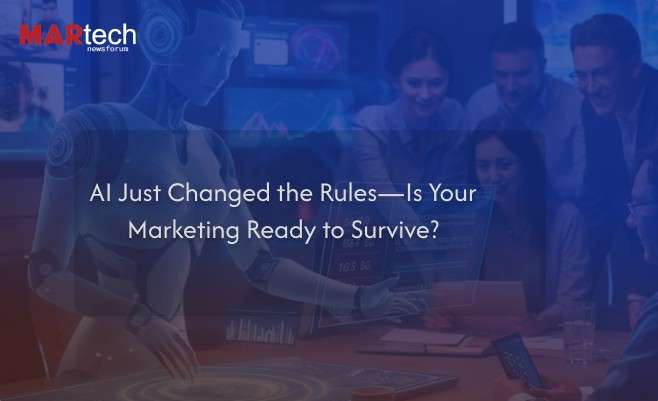
The age of AI-driven marketing isn’t coming—it’s already here. And it’s changing everything.
Artificial Intelligence has crossed the threshold from experimental to essential. What began as a set of smart tools to automate tasks has evolved into a disruptive force reshaping the very core of marketing strategy, execution, and measurement. The rules marketers once followed—build a campaign, push content, wait for results—no longer apply in the same way. AI is demanding a faster, smarter, and more responsive marketing function.
Today’s marketing leaders face a stark reality: adapt or fall behind. The question is no longer whether AI will impact marketing, but whether your team is prepared to survive—and thrive—in a landscape transformed by algorithms, automation, and machine learning.
AI as a Marketing Power Player
In the last 18 months, AI has progressed from a supporting role to center stage. From content creation to customer segmentation, from predictive analytics to autonomous campaign management, AI now influences nearly every stage of the buyer journey.
Large language models generate high-quality, on-brand copy at scale. Computer vision tools are transforming visual asset production. Predictive analytics engines suggest the right content for the right person at the right time—without human intervention. AI is optimizing email subject lines, rewriting ad copy based on real-time performance, and even adjusting website layout dynamically depending on who’s visiting.
Marketers are no longer just strategists or creatives—they are curators and supervisors of intelligent systems. And with every passing quarter, the learning curve grows steeper.
The Death of the Traditional Funnel
Marketing used to be about guiding customers through a structured funnel. But AI has shattered that linear model. In its place is a dynamic, hyper-personalized customer journey built in real-time.
AI doesn’t wait for marketers to plan quarterly content calendars. It responds instantly to behavior signals, feeding personalized messages, offers, and touchpoints based on individual interactions. One customer might take a direct path from discovery to purchase in a single day; another might require months of nurturing. AI tracks both patterns—and thousands more—without missing a beat.
This level of fluidity is impossible to manage with human effort alone. AI systems are essential not just for scaling personalization, but for decoding the complexity of modern consumer behavior.
A New Skill Set for Survival
Surviving this shift requires more than adopting new tools—it demands new ways of thinking and working. Traditional marketing skills are no longer enough. The new marketer must understand how AI models work, how to write prompts, how to analyze algorithmic output, and how to measure the right metrics.
Prompt engineering, once a niche technical discipline, is becoming a critical skill for copywriters, strategists, and even CMOs. Understanding AI bias, data privacy implications, and the boundaries of automation is just as important as knowing your brand voice or buyer personas.
AI doesn’t replace marketers—but it exposes weak strategies and outdated processes instantly. Those who cling to old workflows will find themselves struggling against competitors that are faster, smarter, and infinitely more responsive.
Martech Stacks Are Being Rebuilt
The martech ecosystem is undergoing a rapid overhaul. Point solutions that once served singular purposes—email automation, CRM, analytics—are being replaced or augmented by AI-native platforms that offer real-time intelligence and decision-making.
Marketing teams are investing in tools that combine generative AI with performance data, creative testing, and customer journey mapping. Legacy platforms that lack AI integration are being phased out in favor of flexible, API-driven systems that can support continuous learning and optimization.
However, this transformation isn’t just about tech—it’s about trust. As marketers lean more heavily on AI, ensuring transparency, explainability, and ethical usage of data becomes mission-critical. Consumers are becoming increasingly aware of AI’s influence on their experience—and they’re demanding accountability.
Risks of Getting It Wrong
With great power comes great risk. While AI can drive growth and efficiency, it can also cause damage when deployed irresponsibly. AI-generated content that lacks brand alignment, chatbots that misinterpret intent, personalization that crosses the line into privacy violation—these missteps can erode customer trust and harm brand reputation.
There are also regulatory implications. As governments and privacy watchdogs intensify scrutiny over AI use in advertising and data collection, marketers must ensure compliance not just with today’s standards but with what’s coming next. The AI policies and safeguards you implement now will determine your brand’s resilience in the face of future regulation.
What Marketers Must Do Now
The pressure is mounting—but so are the opportunities. Forward-thinking marketers are not waiting to be disrupted. They’re building AI strategies, training teams, and reengineering their entire marketing approach around intelligent automation.
Here’s what survival looks like:
- Audit your stack: Identify which tools support AI integration and which ones don’t. Consolidate where necessary.
- Upskill your teams: Train marketers in prompt engineering, data literacy, and ethical AI principles.
- Test and iterate fast: Use AI to accelerate learning cycles—don’t wait weeks for campaign results. Optimize in real time.
- Protect your data: Ensure you’re using clean, permission-based data and understand how AI systems process and store it.
- Stay human: Use AI to enhance creativity, not replace it. Consumers still crave authenticity, empathy, and human connection.
The Future Belongs to the Fast
AI has reset the playing field. The barriers to entry have dropped, but the expectations have risen. Brands that move quickly, invest in the right tools, and build agile, AI-literate teams will outpace their slower competitors.
Marketing has always been about staying ahead of consumer behavior. With AI, that behavior is evolving daily—and your strategy must evolve with it.